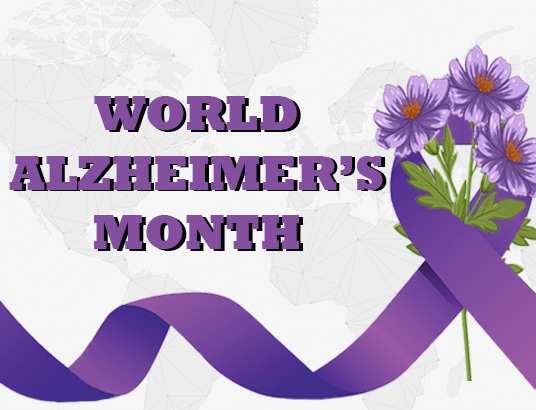Each September, World Alzheimer’s Month invites us to reflect on the realities of dementia. It’s a time to raise awareness, challenge stigma, and ask how we can better support people through the long, uncertain journey of cognitive decline.
For you as Personal Support Workers, and other members of the health care team, this may be your daily work. Work where you witness the changes in the person, moments of confusions, sadness and struggle, and the moments of connection that still shine through. In the midst of the challenges, you are a steady presence.
Why a Palliative Lens Matters
Alzheimer’s dementia is a progressive, life-limiting illness. Yet too often, palliative principles are introduced only in the final days – when decisions are urgent and families are overwhelmed.
A palliative approach invites us to shift that timeline. Excellence in dementia care includes a focus on person-centred care. Excellence in palliative care includes opening the doors to difficult conversations, care planning, addressing issues around loss/grief and dying, from the earliest stages and consistently across all settings.
Dr. Daphna Grossman shares in her conversation on Palliative Talks, that a palliative approach isn’t about giving up. It’s about showing up – with empathy, clarity, and practical tools. It means:
- Recognizing that dementia is a cause of death
- Understanding that symptoms like pain, anxiety, and fatigue may be expressed in non-verbal ways
- Using tools like the Adult Faces Scale to assess discomfort and guide care
- Supporting care partners with education, emotional presence, and shared language
- Honouring the person’s values – whether that’s chocolate pudding rather than protein shakes, or music that awakens memory and joy.
These principles are central to palliative care training programs. Palliative care training programs will help care providers to develop the knowledge, skills to support people living with dementia from diagnosis through to the end of life. And these skills can be integrated in long-term care, hospice care, and community living homes.
Understanding the Trajectory and a Few of the Challenges
People with Alzheimer’s dementia often experience physical decline over a long time. This is often referred to as a “slow decline”.
This trajectory is marked by periods of stability and then further loss of function. People will lose the ability to walk, to dress themselves, to stand, to feed themselves, to chew, to swallow. Eventually, they become unable to swallow. Cognitive function will decline, and the person may struggle with higher-level tasks such as following a recipe, or keeping appointments on a calendar. People will lose their ability to communicate clearly. Confusion and agitation may increase if they are not able to understand their environment or remember the relationships.
Medical complications, such as infections, pressure sores, or aspiration pneumonia, can accelerate decline and increase distress.
Caregiving family, friends, and communities may enjoy times of connection, humour, and joy. They will also experience times of exhaustion, frustration, and grief. In addition to grieving what has been lost, they deal with layer upon layer of uncertainty. Uncertainties include: When will death come? What will it look like? What decisions lie ahead? What other changes or illnesses might arise?
Although there are many unknowns, there is much we do know about dying with dementia – and that knowledge matters. It can help families prepare, grieve, and find meaning in their loved one’s final chapter. What we do know is that:
- The overall trajectory will be one of decline
- Death is certain to occur
- Comorbidities like infections, heart disease, or diabetes can influence the shape of the decline.
- In late-stage dementia, many medical interventions offer little benefit and may cause distress.
These insights are often explored in depth through a palliative care training program. Training can help care teams integrate a palliative approach, engage in serious illness conversations, and advance care planning. They can help recognize when active treatment is no longer appropriate. It can be very helpful to have palliative care providers mentor team members until the staff in long-term care or community care are competent and comfortable in having these conversations on their own.
Tools for Identifying People who Might Benefit from Integrating a Palliative Approach
Tools that can help guide the team to identify when a person may benefit from integrating a palliative approach into the care include:
- The Gold Standards Framework Prognostic Indicator Guidance (GSF PIG) aims to help the health care providers in earlier identification of those patients nearing the end of life who could benefit from a hospice palliative care approach to care. and
- The Supportive and Palliative Care Indicators Tool (SPICT) which helps identify people with deteriorating health due to life shortening conditions so they can be offered early palliative care and future care planning. See: https://www.spict.org.uk/
These tools don’t provide a clear prognosis – but they give information to help identify those at higher risk of decline, and can help the family and the team prepare. This helps the family and care team to shift from a reactive to a proactive approach. These tools can be found in our palliative care resources for nurses and PSWs or you can download them using the links below.
Gold Standards Framework Prognostic Indicator Guidance PDF
Supportive and Palliative Care Indicators Tool (SPICT) PDF
Indicators of Advanced Dementia
Triggers to consider that someone is entering a later stage include:
- Total dependence for dressing, walking, and self-care
- Urinary and fecal incontinence
- No consistently meaningful conversation
- Barthel score <3. Includes the basic Activities of Daily Living (ADL) as core to the assessment
- Recurrent infections, weight loss, or reduced oral intake
- Severe pressure sores that will not heal or aspiration pneumonia.
These indicators help care teams recognize when a person may especially benefit from a palliative approach – ensuring timely conversations, appropriate interventions, and support for families. A palliative care training program can help frontline workers communicate these changes, collaborate with the team to open discussion with the family, and integrate palliative care principles for symptom management and family support.
What You Can Do
Whether you’re assisting with daily routines, teaching future clinicians, or supporting families through complex decisions, your role is vital.
Adopt a Palliative Care Approach to Dementia Care
A palliative approach to dementia care includes:
- Recognizing non-verbal signs of distress
- Using appropriate tools to assess discomfort
- Supporting care partners with education and emotional presence
- Promoting culturally safe practices
- Encouraging early conversations about goals of care and values.
Help Create Positive Outcomes for People Living with Dementia
The Alzheimer Society of Canada’s Landmark Study outlines key actions for frontline care to create positive outcomes for people living with dementia:
- Advocate for early detection and timely diagnosis
- Promote dementia-friendly practices in homes, clinics, and communities
- Support care partners with empathy, education, and connection
- Champion culturally safe care for diverse populations
- Build awareness and reduce stigma, one conversation at a time.
Looking Ahead
By 2030, more than 1 million people in Canada may be living with dementia. By 2050, that number could exceed 1.7 million. These aren’t just statistics – they’re families, communities, and care teams who will need support, guidance, and compassion.
This World Alzheimer’s Month, let’s move beyond awareness. Let’s build systems that honour the full arc of dementia. Let’s equip care teams with the tools they need to offer comfort and clarity. And let’s remind each other that even in the face of decline, palliative care is still deeply human. And as we integrate a palliative approach, we affirm life.
Through a palliative care training program, we can prepare our teams, ourselves, and the families to provide competent and compassionate care.





